Nepalese prime minister resigns to pave way for new government
 Kathmandu - Nepalese Prime Minister Girija Prasad Koirala Thursday announced his resignation in a bid to pave the way for the formation of a new government.
Kathmandu - Nepalese Prime Minister Girija Prasad Koirala Thursday announced his resignation in a bid to pave the way for the formation of a new government.
Koirala announced his resignation in the constituent assembly which was elected on April 10 and is tasked with drafting a new constitution for the country and forming a new government. The assembly also acts as parliament.
"I am the prime minister now and today I announce my resignation from the post in this assembly," an emotionally choked Koirala said.
Koirala, who is now in his mid-80s, has been the prime minister and the acting head of state for nearly two years since the then king Gyanendra's government was toppled by a mass democracy movement.
"I have carried this burden and anguish for long and I would like to leave the responsibility to this assembly," Koirala said.
Koirala also called for continued cooperation among the political parties.
"In the past, you have demonstrated cooperation and unity and I request you now to carry on that path with or without me," Koirala said.
Koirala's resignation came amid a growing war of words between the Maoists and the Nepali Congress.
The Maoists, who emerged as the single largest party from the April election, have accused Koirala of trying to hold on to power and of trying to prevent them from leading a new government.
Nepalese media reports said Koirala's resignation will come into effect only after the appointment of a president, vice president and the prime minister.
However, the assembly still needs to amend the interim constitution to include the provision for a president and vice-president.
Nepal's interim constitution does not have provisions for the two posts as the country was a monarchy until the assembly abolished it on May 28.
The Maoists had initially claimed both the posts of president and prime minister, but now say they will settle for just the prime minister.
All three posts will be chosen by the constituent assembly through a simple majority and the Maoists leader Prachanda is likely to be the next prime minister with his party forming the next government.
Nepali Congress has previously said it will not join the government and will become the main opposition. (dpa)